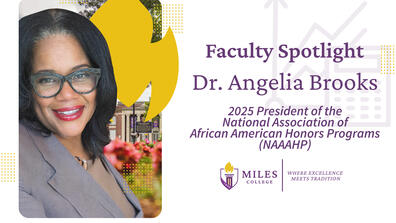
Alabama’s Miles College awarded prestigious National Science Foundation grant
A researcher at Alabama’s Miles College has received a National Science Foundation (NSF) grant, the first for the historically Black institution.
“This prestigious award, managed by the Environmental and Ecological Systems Division at NSF, marks a significant milestone in the institution’s commitment to advancing scientific research and education,” the school said in a news release announcing the grant.
The $300,000 research grant was awarded to Nikaela Flournoy, Ph.D., an assistant professor of biology who joined the staff at Miles College in 2021. Flourney is a native of Fairfield, the Birmingham suburb where Miles is located.
The three-year grant will fund a deep-dive study into bacteria found in the West Fowl River watershed of Mobile County. The “indicator bacteria” they will be measuring, Flournoy explained, typically do not cause diseases. But when their numbers exceed standard limits, it may indicate the presence of microbial contaminants that can affect the water quality in Portersville Bay, located between Bayou la Batre and Dauphin Island – a critical area for the region’s shellfish industry.
Under Flournoy’s guidance, Miles students will spend the coming year gathering, monitoring, testing and analyzing water samples taken from several sites within the watershed. She said the project will provide students with valuable experience in the field, opportunities to conduct experiments in the lab and experience analyzing the research data.

Nikaela Flournoy, Ph.D., in the lab at Miles College. (Ta’Ron Williams)Flournoy noted that students from diverse majors – including biology, environmental science and computer science – will take part in the research. The students will also be involved in pulling together the information and writing the results for submission to peer-reviewed scientific journals, and for presentations to scientific meetings and conferences. She said the hope is that the study’s results can also be used by watershed management experts to help identify sources of certain types of pollution affecting the bay, to help reduce their impacts.
“
I look at this grant as the first of many opportunities
Nikaela Flournoy, Ph.D.
said Flournoy, who has been working with Miles students on other water-quality research projects in the state’s Black Belt region.
“It’s an opportunity for Miles to shape what research looks like at the college, and for students to get high-quality research opportunities, build their research competency and their research confidence,” Flournoy said.
She noted the grant, and other science-related projects taking place on campus, are also helping to open Miles students’ eyes to post-graduate research options and career paths.
“Seeing them realize, through their undergraduate research training, the careers they want for themselves … it’s an exciting time to be a student at Miles College.”
Flourney is “dedicated to conducting innovative research that will impact both academia and the broader community,” the news release from Miles said. The NSF award “reflects the institution’s commitment to fostering research excellence, faculty mentorship and expanding opportunities for students in the sciences.”

Miles College seniors Blake Speed and Rashika George, and junior Jaylin Jones. All three are biology majors. (Ta’Ron Williams)
Flournoy received her undergraduate degree from Alabama A&M University, another historically Black institution. She earned a master’s degree in microbiology from the University of Iowa, her Ph.D. in biological sciences at The University of Alabama (UA) and completed post-doctoral studies at UA’s Alabama Water Institute, a nationally recognized research center.
After completing her postdoc, Flournoy became a Mirzayan Fellow under the National Academies of Science, working in the academies’ Gulf Research Program. Her research achievements also include being selected for the 2023 Integrated Groundwater Management Summer Faculty Fellowship, funded by NSF, at the University of Alabama.
Miles College was founded in 1898 and is affiliated with the Christian Methodist Episcopal Church. In the early 1960s, it was a hotbed of human rights activism, with students playing an important role in efforts to dismantle nearby Birmingham’s and the state’s Jim Crow segregation laws.
Alabama is home to more historically Black colleges and universities than any state in the nation. Learn more about Miles College at miles.edu.
Original article: https://alabamanewscenter.com/2023/12/15/alabamas-miles-college-awarded-prestigious-national-science-foundation-grant/





